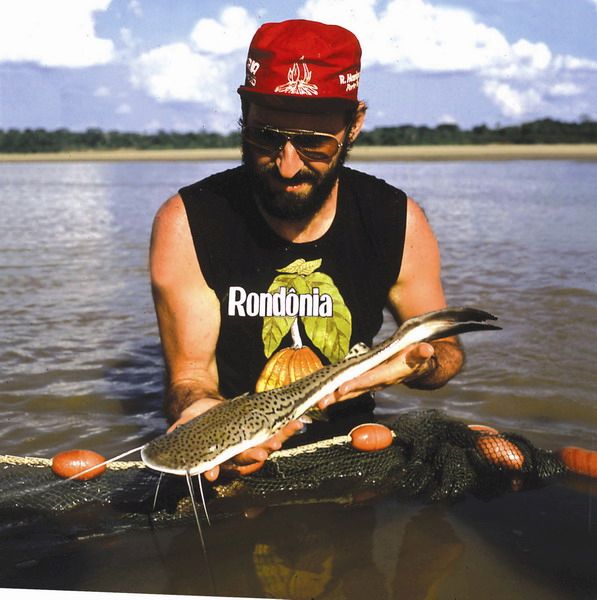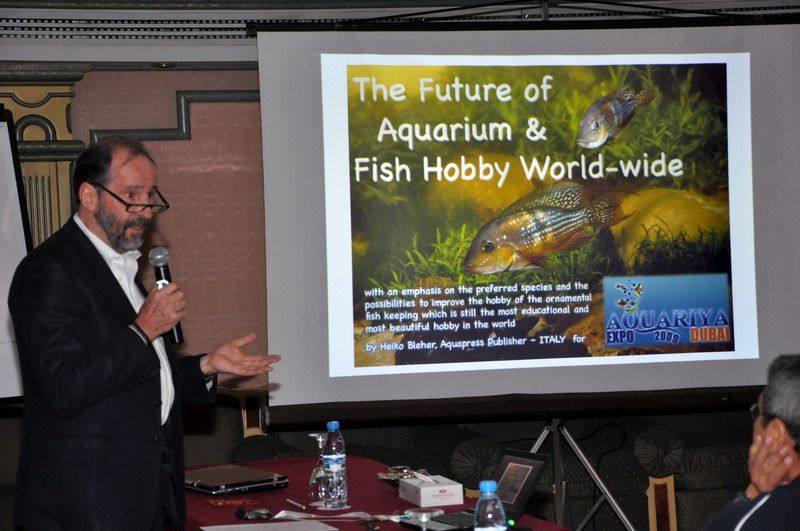Heiko Bleher - interview with a legend
- Detalji
- Hitova: 132975
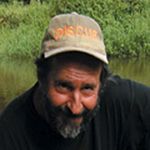 Exclusively for Akvarij.NET web portal, we bring you an interview with a legend of aquaristics!
Exclusively for Akvarij.NET web portal, we bring you an interview with a legend of aquaristics!
Great explorer and expert, a person responsible for the fact that we have so many beautiful fishes and plants in our aquariums these days, a person of exceptional value in the history of aquaristics, Heiko Bleher!
Mr.Bleher, Welcome to Akvarij.NET
It would be an understatement to say you are having an interesting life, we might even say that lots of hobbyist envy you. Tell us how do you feel today when you look back at what you accomplished during your lifetime.
What can I say? It started, as I recall very well, with the age of 4 assisting my mother decorating aquariums at the bombed Frankfurter Zoo, in Frankfurt, Germany, in a city which was almost erased from the map and soon after that I was crossing the jungles of today's Equatorial Africa carried by with my mother in the searching for aquatic plants, fishes, amphibians, reptiles and mammals across the deepest jungle. Although very young then, I recall every detail as was yesterday, or as my last weeks adventure when I was collecting on my 846th expedition/field/research trip in the southwestern part of Iran at 50°C in the shade with water temperatures of the endemic cichlid and Killi-fish species over 39°C...
The accomplishment you are asking for I see not in the many species I have discovered and which were, and are, helping to catalogue better the aquatic biodiversity of our planet, for present and future generations (and specially before it is to late), but more though to help people around the globe to enjoy even more what certainly was (and hopefully is and will always be) the most beautiful and educational hobby in the world. A hobby that anyone can have and learn from. Those 4000plus fresh- and brackwater species I have introduced into the aquariums world-wide helped people to enjoy these beauties every day, to watch their unique biology (freshwater species are much more diverse than marine species, they had to adapt through evolution to extremes, which was not necessary in the Sea), to see their breeding behaviour and to learn from their biology, more than from any other media. As everything we know comes from nature...
So, if you want: I see an accomplishment in helping children and adults around the globe to enjoy life more, to learn and for them to register what we have (in most of the cases "had") out there in this unbelievable nature than man is destroying every single minute more and more... And I help for them to see the truth what happens out there (during my hundreds of documented lectures & Seminars on all continents), which they never see and if they hear from it, it is in most of the news twisted and changed acording to those who manipulate the media...That is an additional accomplishment, which one day might help for some one to wake up.
You were just a child when you moved with your mother to Brasil. It's general understanding that childhood in lots of ways determines persons path in life and yours was no different. Can you tell us something about your youth, what was Heiko Bleher like as a child?
With the age of 7 my mother took me, my elder brother and the two elder sisters, to South America's into the so called "green hell". (One should read my mothers book, and amazing pocket book about her adventures and life of continuous discovery: Iténez - river of Hope.) I was taken out of the primary school, where I was one of the worst students – my teacher had already informed mother that I would not make it above the 3rd class – for this trip, which was to last but a few month and took more than 2 years. But to talk about this here and now, about this not-to-believe journey, the hardship my mother went through with 4 children, about the missionaries killed and eaten and living 6 month with those cannibals, about my mother's discovery of more than 60 new aquatic plant species (most of today's sword plants, to name just one genus: Echinodorus), countless fish species, amphibians, reptiles and mammals, insects, bromiliads and orchids (several named after my mother), is not possible. I learned so much from this untouched nature, from the Indians, from native animals and their biology, from everything around me (including several languages - today I am fluent in 8 languages at least less in others and many dialects). And believe it or not, but it is the truth: when I returned to my school 2 years later the Director (Professor) said: "With your bad record you must undergo a one-month test and than we see in which class we will place you, back into the 3rd or the 2nd class..." After one month full of testes, I remember very well, I was called to an audience of 16 teachers and the Professor. Me sitting there alone in front of all of these educated high-class teachers and Professors waiting for an answer, when the Director got up and said: "Mr. Bleher, unfortunately your tests showed that you have to be placed two classes ahead of all other students"... From then on, although having skipped 4 classes/years, I was the best in my class and the example pupil of all in the entire school. And all of this came from nature... The best teacher on Earth.
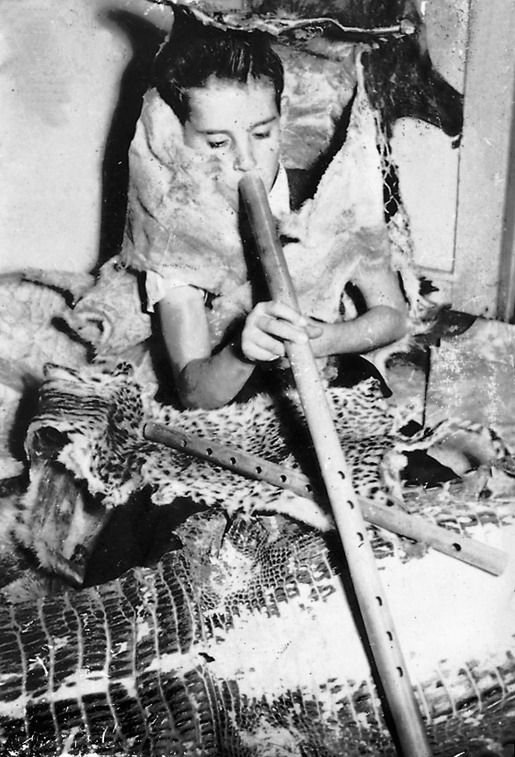
A friend of mine really wanted me to ask you what was it like to live with native Indians regarding the fact you moved there at such young age. How big of an impact was their way of life on you, did it make you appreciate the nature even more?
Yes, much more. I learned so many things from the Indians, very hard to describe just a fraction here. Only one thing: I learned how to survive naked, with nothing on, in the deepest jungle, and still today I always walk only barefoot, anywhere, like the Indians.I appreciated nature so much, something very hard to describe, and I can tell you, every time I am back (and every year several times, otherwise I could not live anymore) I feel "at home". There is nothing like it. And it hurts so much seeing everywhere and around the globe the endless destruction of nature. Non-stop. I can say, whenever my last day comes, I lived a full life, I was able to see things most people never even dream of, I saw Paradise which is no longer, and future generations will only be able to see it in a movie (a fraction of what I saw) or on pictures. I try to do more and more nature-biotope aquariums, so at least people around the world can see the true under water world (and the fishes appreciate it every time when I give them their "home", which still few aquarists do... unfortunately, and Amano's nature aquariums are beautiful, but not nature...).
Aquarium Rio, starting in Rio and moving to Germany after several years – at that time you were ready to make it on your own, can you tell more about that and how does it feel be one of the pioneers?
I was 19, when they called me the best breeder of tropical fishes in the US and wanted to give me a better salary to stay, but I had finished my studies (in the University what I wanted to learn) and it was clear in my head that I will never work for anyone again. As hard as it may be. I followed into the footsteps of my mother and opened what at the time with the money I had earned in two years of hard work in the then most beautiful (large) city in the world Rio de Janeiro, Aquarium Rio. (It is no longer to me a cidade maravilhosa because of the incredible crime rate and the explosion of population - close to 20 million people now and most of them living at the edge of poverty). But after two years, importing and exporting, collecting monthly all fishes myself in the interior, decorating aquariums and doing the public aquarium in Rio, I was broke again, no one in Europe had paid... Therefore I moved to Frankfurt, borrowed DM 1000 from my father and opened Aquarium Rio in the outskirts, renting an old nursery. I traveled every month back to South America collecting all fishes myself, and returned, quarantined them and delivered them against cash throughout Europe, I was the only one in for many years doing this and introduced fishes no one had ever seen before...
It takes a lot of energy and love for what you do, to be able to maintain such rhythm all your life. Where does all this energy comes from and who do you see as your biggest support?
Yes, but remember, I am doing this all my life. I am used to it and if I have to sit still (like on a computer) for to many days, I go mad. My rhythm is for sure much more intense than what you can imagine, I do what hardly anyone does and penetrate still where no one else goes. Like last year in India I researched 37 rivers in 10 days, what groups of people do not do in decades. Or like I found a new subfamily and genus (Bleheratherina) in New Caledonia in 3 days, where the French team (with 40 people) where looking for during their 30 years of stay in New Caledonia... I work different from anyone else. I am not a hobbyist, this is my profession, and has been all my life. My biggest support is my drive, any new fish I find, or re-discover, gives me a new support, a new drive. Unfortunately I never have had any financial support and therefore I must always work very hard to have enough money to do more, to pay for my expensive travels. recently I take, on selscted expeditions, some people with me to share the cost. I could never ever lay lasy on a beach or travel to far places just for the sun. This to me is lost (life)time. Life is to short to waste it. Nature is my biggest supporter...as long as it exists... and naturally people (from institutions, scientists, hobbyists, breeders, and the layman who appreciates my work).
So many species you discovered, so many species named after you. In aquariums all over the world there is something alive discovered by Heiko Bleher or named Bleheri! Is it overwhelming when you think about it, did you ever look at it from that perspective?
No, never. Actually I never ask anyone to name a fish or plant after me. This is up to the ichthyologist or botanist. As long as it is a nice fish or plant and it will make people happy, that is what counts for me, not a name...And never ever was any fish or plant named after me, which has not discovered by myself. You may know that most species are named after a doner, a scientist they want to give the credit, a wife (to look good) or a buyer... Actually very few species have been named after the actual collector in history of science, and I am very happy that I can say that all those which bear my name have been discovered by me.
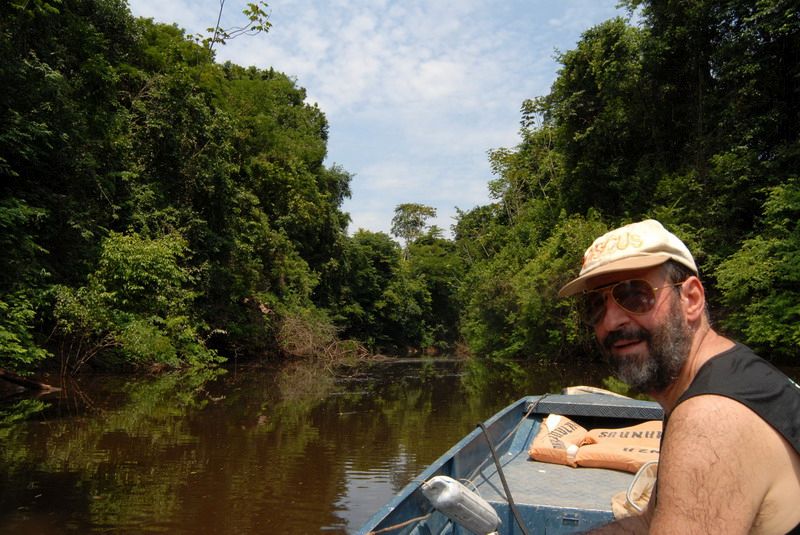
If someone would ask you to pick 5 most favorite species which you discovered, fish and plants included, which ones would pick and why?
Very difficult to answer. I love all fishes, even the most colourless ones, each one has its uniqueness. But let me try some fishes firsts, or better unusual fishes:
1. Hemigrammus bleheri has to be among those, because it is one of the most fascianting shoal (group) fishes. It has given pleasure to hobbyists around the world and is just beautiful, a perfect community-tank fish always active.
2. Chilaterina bleheri, an amazing rainbowfish, which can flash its golden/yellow stripe and cmmunicate with partners, by signals like morse. Still unknown by man of its language... and if kept well fantastic colours.
3. Bleheratherina pierucciae - most interesting sweet water atherinid, but not kept in aquarium, as far as I know. Its biology is amazing, and even more so
4. Oryzias bonneorum - from the point of biology extraordinary and possibly unmatched. The female changes its body-form during pregnancy to place the fertilized eggs in a body-cave and its pelvic fins grow larger during this time to hold the eggs tight to its body for exactly 14 days and when the babies are able to swim free and escape the predators she lets them loose. The females body turns back to normal and the pelvic fins as well... only in the hobby from my discovery and collecting in a high and remote Sulawesi lake, only recently described.
5. Moenkhausia heikoi - probably one of the most beautiful characoids ever discovered. (See in my book, Bleher's Discus volume I).
But I could go on and one... Symphysodn haraldi - The Royal Blue Discus; Steatocranus bleheri - the beautiful dwarf cichlid; Leporinus bleheri - to me the most amazing Leporinus ever found; Pritis leichhardti - the largest freshwater fish discovery of the 20th Century by Heiko Bleher (Guiness Book of records); Hyphessobrycon amandae (I had asked the author to consider a fish named after my mother who discovered so many and never given credit for, as I discovered it, a beautiful community-tank group fisd); or the recent Dario sp. (still to be described) with 9mm TL, adult and having babies...
Plants:
1. Echinodorus bleherae - discovered with (for) my mother in the State of Pará. Probably the most asked for aquarium plant around the world (and maybe one of the most decorative and easy to keep).
2. Echinodorus osiris - fantastic submerse aquarium plant.
3. Echinodorus heikobleheri - still not so many in the hobby, a real beauty.
4. Alternanthera reineckii - my mothers discovery, one of the real aquarium beauties.
5. Cabomba furcata - the most beautiful Cabomba full red colours we discovered and introduced as well.
Hemigrammus Bleheri, could you tell us shortly how you discovered it?
There is so much written about it, I am sure most aquarists know. And also details are in my book (bleher's Discis volume I). It was in the Jufaris, a left-hand tributary of the Middle Rio Negro on a weird boot-strip in late 1965... and for more than 20 years people mixed it up with H. rhodostomus which is much less colourful and less active, and only found in the lower Amazon.
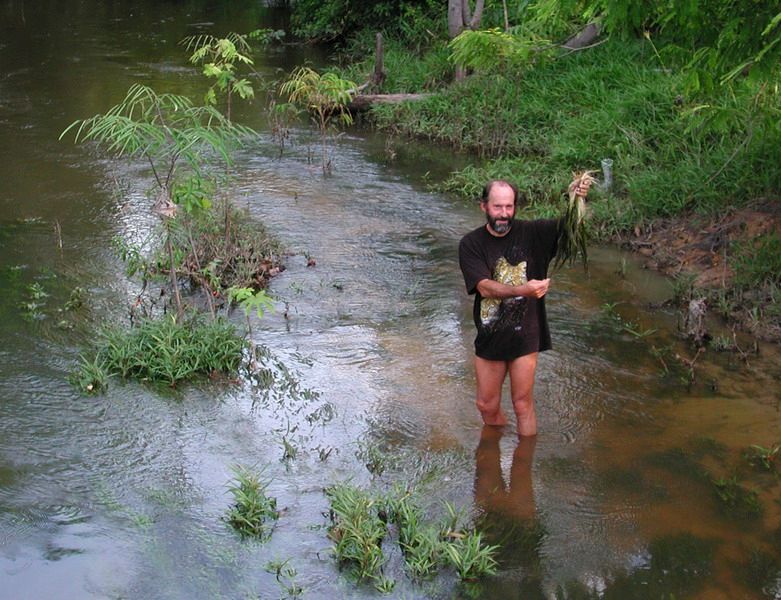
Where and when did you give your first lecture, what was it like?
In 1964 in Florida, about breeding new aquarium fishes (as mentioned, I had been elected best breeder) and also about Discus fishes and our expedition 1953-1955 into Amazonia. It was sensational, as the Discus one was on TV and screened throughout America...But every year the request for lectures and seminars has increased and this year (2009) I have been invited to give a total of 55 lectures & Seminars around the world... and for the next years it looks as it will still increase...
"Bleher's Discus" volume 1 is an amazing book, exceptionally well taken among both the experts and hobbyists. So many great reviews proved it's value, Ross Socolof said; "Bleher's Discus, Volume 1 is a true labor of love, and the last word on Discus." Iggy Tavares had an interesting note too; "Having made more than 300 collecting trips in the Amazon,if there's one person who does know an awful lot about discus it has to be Heiko Bleher". I've also read that it had even attracted attention of several celebrities, such as Leonardo DiCaprio, Pierce Brosnan, Sting and James Cameron, the director of ‘Titanic’, were you surprised by that fact and overall all the attention it attracted?
How do you know this all? I am very happy that people read about the facts of Amazonia and that even the INPA people (Instituto Brasileiro de Pesquisas da Amazonia) translated it into Portuguese because they say no one has written so much in one book about the Brazilian Amazon region, its (first)explorers, Indian tribes (past adn present), discoverers and the caboclos an so much more. We will see how it sells. Now also there on the market. And next month I am in China giving two days lectures at the Shanghai Ocean University where 1500 students study ornamental fishes only, which translated it into Mandarin...
I am also happy that some celebrities read it (the President of Conservation International just called a few days ago and gave me a lot of credit...) and maybe they will do some more for the protection of the rain forest...(although in many parts to late).
“Aqua geõgraphia” is out since 1992, how would you comment on development of that magazine till now and what are the future plans? Have you ever considered an issue for smaller markets like Croatia and the region of former Yugoslavia, regarding the fact of similar languages in these countries?
Unfortunately after 9/11 I was not able to get more adverts (only 4 instead of 12 which I need to pay for its cost) and the last issue came out with volume 24 (4 in one). But still today we sell every day back issues and people around the world love it. AG was the first international magazine of nature and life above and below water published in 6 languages - long before the 100 year old National Geographic (they actually copied many things from AG and when they saw its success they also started to do it in other languages as well - but AG was the first and I am happy anybody was able to give them an example). They want to do AG now in Russia, the "O" number is out, but still waiting. I do for a major publisher there a yearly Russsian edition called "Bleher's Biotopes in nature and in Aquaria - in English only available on-line, the Russian hard copy only in the Federation. I had much mishaps with AG in regards to distribution. 120,000 copies sold in Spain never paid, all US copies Axelrod took the money, the German distributor never paid the due fees, etc., etc. I have material for monthly issues, but I can and do not want to have anything to do with the distribution anymore (lost to much).
But we are still doing quarterly aqua, International Journal of Ichthyology and it is up to this day the only full colour peer-reviewed Scientific Journal of Ichthyology.
You are well known for your love of biotopes, which would be your main instructions for our readers on how to create a genuine biotope, what are the traps and things to look after in that endeavor of creating a piece of some remoted part of this planet at home? Maybe you can even give us an example on certain biotope?
I published many examples in the Russian edition of Bleher's Biotopes in nature and in aquaria, and also a few on my website.(And will do 4 more next week in Duisburg at the 1st International Cichlid Exhibition and Conference.)
My suggestion is to look at nature carefully and copy as much as you can. Look out for the species living together, the biotope and make notes (or read). Apply this to your aquarium and you - and even more your fishes - will be very, very happy.
If you would have a choice of having only 3 aquariums, which biotopes would you create?
I would create at least one tiny biotope where many species live in harmony, small species, some only 1 cm TL, that could be a effluent of the Rio das Mortes with a nice group of Hyphessobrycon amandae, some Aspidoras, Otocinclus, the plants living in it and driftwood with fine white sand...
Also a very large aquarium with40-50 wild discus fishes, driftwood, white sand, Geophagus, Mesonauta, Pterophyllum, Loricariids, Stingrays, etc.
And maybe a medium sized aquarium with an New Guinea biotope, with the beautiful rainbowfish and blue-eyes like a biotope of a lake, ie Lake Kli, or Lake Ayamaru, or Lake Kutubu.
Numerous expeditions, countless situations you have found yourself in, great ones and not so good ones. Following, there have to be numerous anecdotes you must have. Would you be so kind of sharing some with Akvarij.NET readers?
Impossible. Will take some time (which I really do not have and it is 03.29 in the morning to be up early...). I could tell you about the Anaconda which was crossing the jungle track in Mato Gross and the expedition-convoy had to wait for one week until they saw its tail coming.... About the boto (freshwater Dolphin) that makes the women pregnant when she has no pregnancy, I could tell you about the plane I boarded from Kinshasa to Douala 10 times: First they forgot to fuel it, than the captain did show up, the next time drunk and had to be replaced, Than a passenger was missing. Than the President needed it for an internal flight. Then one engine broke down. Than now Stewards, etc. It took 1 week to arrive, and it was filled with living chicken, goats, turtles and dogs, no seat belts. Or the DC 3 I boarded in Fort Lauderdale to collect in Guyana with 320,000 chicken on board - sleeping in between. Or flying in a cargo department of a Lufthansa 747 Boeing for 27 hours petting my freshwater saw-fishes collected and filling the tanks up with hot water 12,000 high...
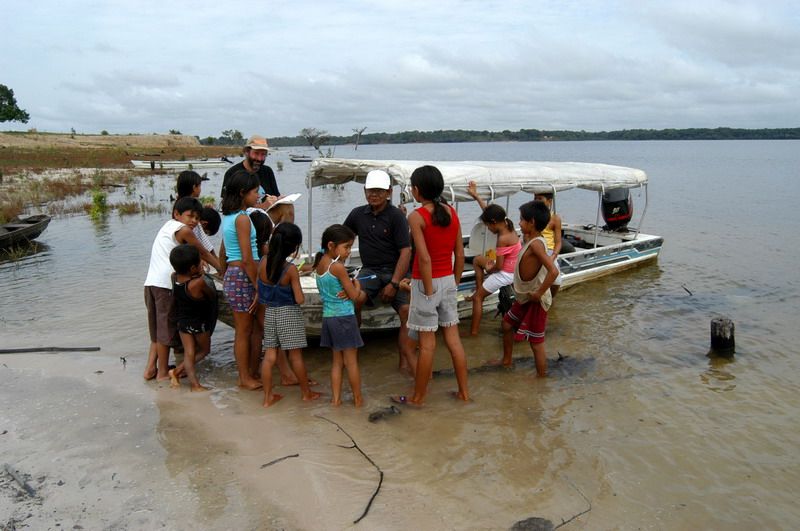
One of your next lectures is gonna be at "1st INTERNATIONALE CICHLIDENTAGE 2009" in Duisburg, Germany. The one we are interested in is "Collecting in the Rio Jutaí – where no one collected before", in few sentences, can you tell us which species were collected there, what is the biotope like and which would be the facts you personally found as the most interesting on that journey?
400 green discus (Symphysodon aequifasciatus) and 84 other species of fishes of which several are new, including a new angelfish.
You have done lots of interviews during time, is there something nobody ever asked you but you would like to mention or talk about?
I must say you made some good questions and I guess I have written here more than in most other interviews (not sure), but I must end now. I can hardly remember a question not being asked. Maybe why I do not have a TV (probably the only person in Italy), or why I do not drink Beer (probably the only living adult German who does not), or why I do not believe what is said in the media (because I know more? or better? or have seen it with my eyes, which cannot lie to me), or why I love nature? (because it cannot lie...).
I understand you visited Dubrovnik 2 years ago and you liked that part of our country very much. On behalf of Akvarij.NET team i'm inviting you to visit us again on some occasion, maybe even on Akter FEST 2010!
If I get an invitation early enough and can still squeeze it in between, I love to come in 2010.
Mr.Bleher, thank you for this lovely interview, it was an honour.
Thank you, it was a pleasure.
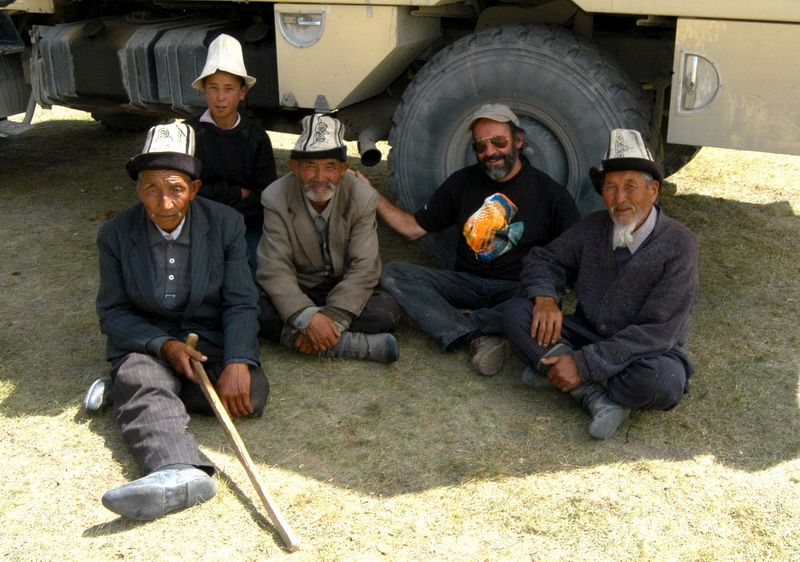
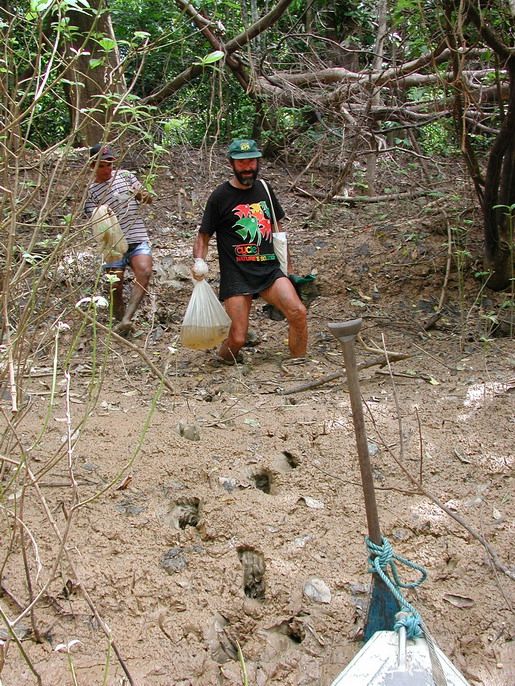
By Neven Vorkapic
Photography: Heiko Bleher

